September 10, 2025

The Junior Science and Humanities Symposium (JSHS) recognizes teachers every year for their dedication to mentoring student researchers, guiding projects from idea to presentation, and fostering the confidence and curiosity that empower their young scientists. Each year, JSHS selects 10 standout teachers for the Teacher Award. Learn about and hear from this year’s winners–the amazing educators that helped make JSHS possible! Thank you for all that you do for our students.
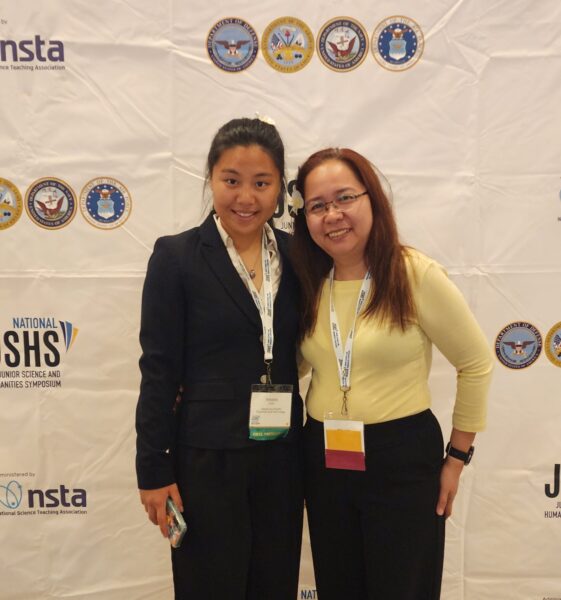 Meet: Karen Dizon
Meet: Karen Dizon
Originally from the Philippines, Karen Dizon moved to American Samoa in 2008 and has been teaching there ever since. She began at Pacific Horizons School in 2010, teaching middle school math and science but has now taught higher math like AP Calculus and Environmental Science for high schoolers. In addition to the classroom, she serves as the secondary math and science department head and deputy director.
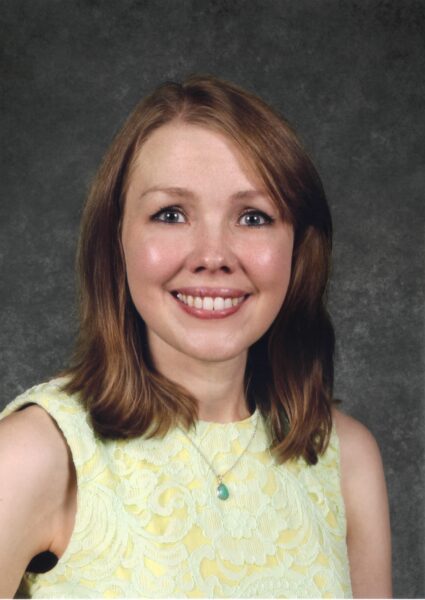 Meet: Alison Huenger
Meet: Alison Huenger
Based in Long Island, Alison Huenger teaches at Manhasset High School, where she has spent the past 14 years as a science research teacher and 11 years as a lead teacher, science research specialist and director of the science research program. Beyond the classroom, she serves on the boards of several local STEM fairs, helping expand opportunities for student researchers.
Meet: Richard Lee
Richard Lee is a biology teacher at the Bronx High School of Science, where he also supports student research projects. He has guided numerous students to present at regional and national competitions. Richard first connected with JSHS in the early 1990s!
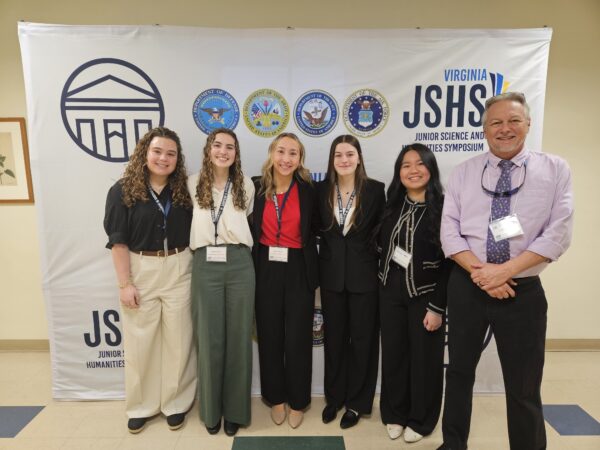 Meet: Kevin Goff
Meet: Kevin Goff
Kevin Goff is a science educator with more than three decades of teaching experience in Virginia. He currently teaches at the Chesapeake Bay Governor’s School for Marine and Environmental Science. Kevin has pioneered the school’s independent student research program, guiding seniors to conduct original projects and present at symposiums such as JSHS.
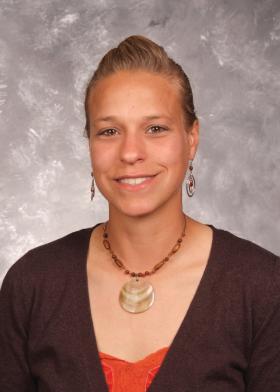
Meet: Tara Henderson
Tara Henderson is in her 20th year teaching at St. Ignatius, an all-boys college preparatory school in Cleveland with more than 1,400 students. She primarily teaches biology, with some chemistry courses, and she has always been drawn to science.
What does JSHS look like in your classroom?
Karen: I first became involved with JSHS in 2022, when my students entered the Hawaii & Pacific JSHS with a project on local algae and biofuel. Teaching STEM in American Samoa can be challenging, as we don’t have quick access to supplies or proper labs. What would take a day or two to ship on the mainland takes a week or two! But my students thrived despite those obstacles by being creative. For instance, we would substitute coconuts and alcohol for lab chemicals, as there’s plenty of coconuts on the island! One of my students, Amelie Chen, went on to place third in her category at nationals, making history for the island.
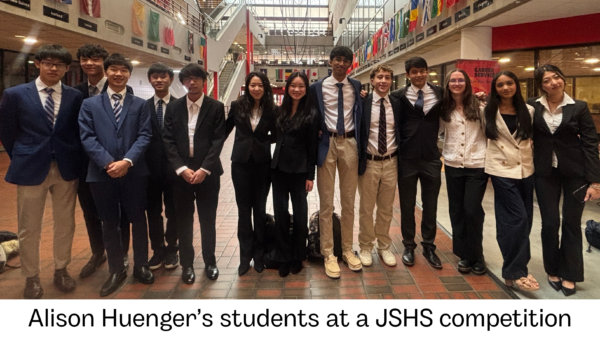 Alison: I enjoy guiding students to construct a project. They are not held back; they can do any kind of science! Students learn the foundations of their STEM topic, read journals and then pitch it to the teachers. They study beyond basic STEM: projects have included astrophysics, machine learning, ecology, and more. I even get to learn more about new topics myself!
Alison: I enjoy guiding students to construct a project. They are not held back; they can do any kind of science! Students learn the foundations of their STEM topic, read journals and then pitch it to the teachers. They study beyond basic STEM: projects have included astrophysics, machine learning, ecology, and more. I even get to learn more about new topics myself!
Richard: JSHS emphasizes presentation skills. I learned how to teach presentation skills to my own students, and I want to keep supporting them through JSHS in the future. I love the pooling of individuals from all over the country, and even if the student doesn’t win, they still learn so much. JSHS prepares students for college level work, too.
How has JSHS helped you professionally as a teacher?
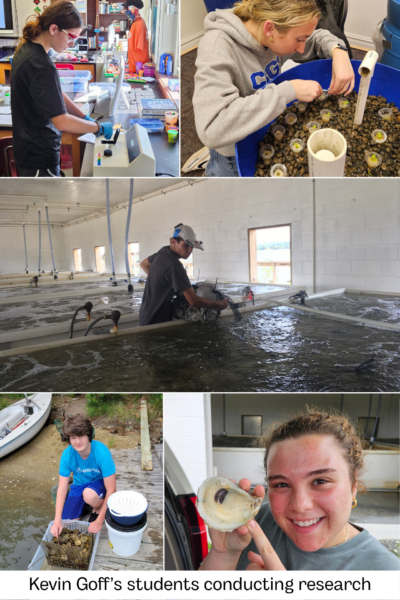 Kevin: The greatest benefit of competitions and symposiums is the experience they give my students. I treat them as quasi-professionals, guiding them through real science while exposing them to authentic STEM practices like peer review and presenting to professional scientists. Even if they don’t pursue STEM careers, they gain confidence, communication skills and discipline that will serve them in any field.
Kevin: The greatest benefit of competitions and symposiums is the experience they give my students. I treat them as quasi-professionals, guiding them through real science while exposing them to authentic STEM practices like peer review and presenting to professional scientists. Even if they don’t pursue STEM careers, they gain confidence, communication skills and discipline that will serve them in any field.
Karen: I feel more introverted as a person, but JSHS improved my confidence. Being up on a stage is different from being at the front of the classroom!
Tara: I benefited from the exposure. Being there with my student reinforced the importance of science research as well as STEM and science fairs. My school is even now starting a club called Science Research Club, and one of its goals is getting more students to participate in science fairs like JSHS!
What would you say to those interested in AEOP STEM programs? Any advice?
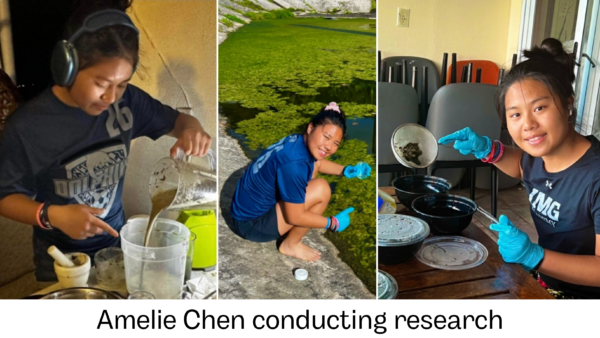 Karen: I want other students to pursue regional and nationals–there’s a lot more beyond the island, don’t limit yourself. Turn in your work–why not! My other students are seeing the opportunities Amelie has now.
Karen: I want other students to pursue regional and nationals–there’s a lot more beyond the island, don’t limit yourself. Turn in your work–why not! My other students are seeing the opportunities Amelie has now.
Tara: The message I always try to get across to kids is: be excited about science! If you can learn how to think like a scientist, you’re set up for success. Be confident. You did the work, you spent this much time on it. The presentation is the easy part–let them see your passion.
Kevin: I encourage students to approach independent research with a growth mindset. It can be intimidating, as the work is complex, but that’s exactly how real science, and life, works. Don’t be afraid to dive in. Even if you don’t win, the experience itself builds confidence and resilience. For teachers, coaching student research is time-consuming, but it’s worth it. Over the years, I’ve refined my mentoring skills, and I encourage other educators to do the same, because it benefits both your students and your own professional growth.
What was winning the Teacher Award like?
Richard: It was totally out of the blue! I was floored, thinking, “I’m just doing my job. This is what kids need, so you go do it!”
Alison: I was so shocked! It was special to know that the nomination wasn’t just from the regional director but also from my students. That validated a lot of the work I’ve done and my educational philosophy.
Kevin: I was both shocked and deeply moved to receive the award—it was a sweet surprise and meaningful to hear such praise, even though I don’t do this work for recognition. Most importantly, it resonated with my students, who were proud to see me honored.
What’s one of your favorite memories from your time participating in JSHS?
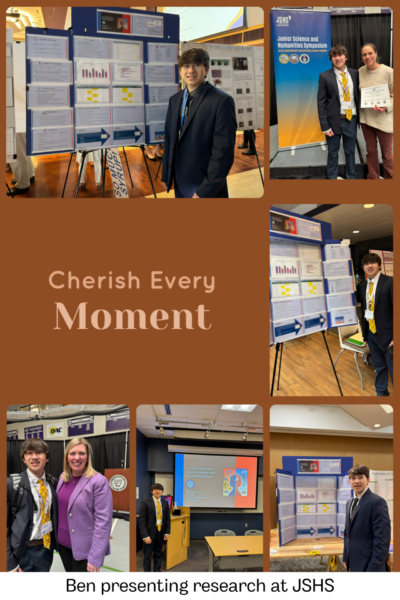 Tara: Watching one of my students, Ben, present. I saw him first in August starting the research all the way to the end of the year proudly presenting up there. It’s a proud moment for me; you don’t always see that coaching aspect in the classroom! I walked with him and got to be a part of him achieving that goal. Ben plans on doing more with JSHS in the future!
Tara: Watching one of my students, Ben, present. I saw him first in August starting the research all the way to the end of the year proudly presenting up there. It’s a proud moment for me; you don’t always see that coaching aspect in the classroom! I walked with him and got to be a part of him achieving that goal. Ben plans on doing more with JSHS in the future!
Alison: It always comes down to the students–working down to the wire with students right before deadlines. During that practice before going to the competition and seeing how dedicated the students are and how much learning they’ve done inside and outside of the classroom is so special.
Congratulations to these award-winning teachers! To learn more about JSHS, click here.
Find a Volunteering Opportunity
Visit our Program Volunteers page for a tool to find the best opportunity for you.
